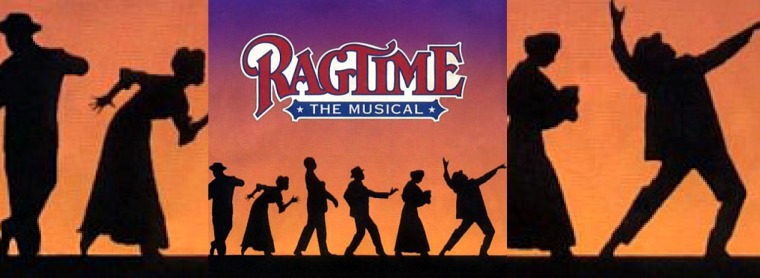Having had the fortune of seeing the original Broadway production of ‘Ragtime’, I feared that it would be no mean feat for the Schenectady Light Opera Company to pull it off. The original staging had the killer combination of Brian Stokes Mitchell, Marin Mazzie, and Audra MacDonald to dazzle and delight, along with a supporting cast of what seemed like hundreds. Add to that a sky-high set that managed to depict everything from a stately Victorian house to the immigrant tenements of New York City to the entire industrial revolution, and ‘Ragtime’ would seem to defy a small local theater treatment. Yet the Schenectady Light Opera Company manages to find the heart of this musical, and keep it beating through every syncopated step.
Under the masterful direction of Joseph Fava (who doubles brilliantly, and integrally, as the costume designer) this ‘Ragtime’ eschews a fancy set and scenery, focusing rightly on the main players and the music, and against all odds, it works. As someone who was raised, for better or worse, on the enormous levitating mansion of Norma Desmond in Andrew Lloyd Webber’s ‘Sunset Boulevard’, I have always guiltily appreciated a lavish set for a night of theater, but when a musical has the strength of an ensemble like the one currently at work in Schenectady, one doesn’t miss the crashing helicopters or falling chandeliers of big-budget spectacle. The score, the songs, and the performers are enough, and despite the relatively small group of musicians off to the side, they manage to make the music soar – filling the former-church space with majesty and might.
Though it is an ensemble piece, ‘Ragtime’ depends largely on the capabilities of its three main leads. The first, Mother, is a trickily thankless role that slowly evolves into something more, culminating with the 11th hour bit of brilliance that is ‘Back to Before’. Joan Horgan deftly portrays Mother’s initial complacence, her defiant growth, and almost imperceptible yet complete transformation before our very eyes.
As Coalhouse Walker, Jr., Jahmere Holland must carry the brunt of the show’s political message, along with its emotional core. Where his voice doesn’t quite rise to the needed heft of some of the anthems, his charisma more than carries him through (along with some impressively fancy footwork).
It is Nick Abounader, as Tateh, who steals the show and gives it its immigrant-and-an-American-dream heart. From the touching scenes with his daughter to the rage at an unforgiving and unwelcoming foreign country, Abounader manages to go from fury to anguish to tenderness in the span of a few minutes, all with a convincing accent. In a voice that blends steely strength and remarkable sensitivity, he handles Tateh’s physical and emotional arc with conviction and commitment.
Providing comic relief and historical touchstones are the cheeky Amanda Jo Marshall as Evelyn Nesbit, Dave Dixon as Harry Houdini, and Debbie May in a feisty turn as Emma Goldman. Excellent vocal work is also displayed by Steven Leifer as Father and Robert L. Hegeman as Younger Brother, while Thomas Dalton Bambury gives racism a love-to-hate-him face in the form of the bigoted Willie Conklin.
Yet for all its individual achievements, it is the ensemble that will always make for a successful staging of ‘Ragtime’, and that strength is largely an attribute of its director. Fava manages to keep an insanely intricate and large cast moving individually and en masse with equal parts of expertise, accuracy, and effortless grace. Even at its most trite, ‘Ragtime’ reminds us of where this country once was, and in doing so can’t help but echo where some of it still is.
Back to Blog
